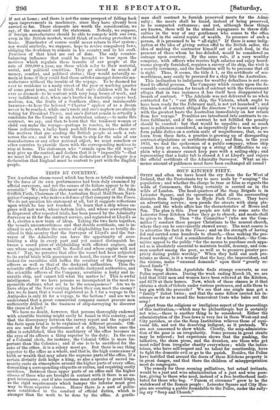TILE EMIGRATION OF 1853.
ALTHOUGH the anticipations that the attractions for emigrants had reached their maximum at the close of last year, the reports from all parts of the country tend to show a continuance of the outpour- ing. In Ireland this is particularly the case ; the movement is obvious to the most superficial notice.
In this respect the present time affords a remarkable contrast to the period succeeding 1842. It was in 1841 that emigration first exceeded 100,000 souls (118,000), with the single exception of 1832 (103,000). The scarcity and the desperate effects of commercial glut in 1842 drove out the considerable number of 128,000 ; of which 54,000 went to the North American Colonies, and nearly 64,000 to the United States. It is certain, however, that many of those set down to the British Colonies really passed on to the Union. But in 1843 the number again fell to the comparatively low point of 59,000; and it is remarkable, that in some of the places most severely, scourged by the famine, suoh as the Scotch Highlands and Islands, seven years ago comparatively few could be induced to go ; whereas now parties of considerable numbers are leaving the Scotch coast via Galway for the United States. And in every port— Waterford, Clonmel, Dublin, Cork, and Liverpool—there are si- milar remarks. It:is so, notwithstanding the fact that "spring work is brisk, and better wages are given" in Ireland as well as in England. In Clonmel they remark that " neither her Majesty's recruiting-officer, nor the sergeant of the Honourable East India Company, though the latter have lowered their standard, can do business : no idlers, and therefore-no reoruits "; but plenty of emi- grants. The same remark has been made in moat parts of Eng- land. The general tendeney to a rise of wages which has been ob- served in the manufacturing districts has extended itself to the agricultural districts, and now begins to tell upon the general trades of mechanics, such as carpenters, who are claiming an ad- vance in many places, from Liverpool to Reading or Bristol.
The reason for this very -general -effect upon wages may be found in the statistics of the emigration. In 1846 it was that the numbers arose to a higher point than they had ever yet at- tamed, and since that time they have almost progressively ad- vanced from 129,000 to 368,000 for 1852. A change in the course is not less remarkable, and it deserves close attention. Let us take the year 1847 as the starting-point. Since that pear, inclu- sive, the numbers emigrating to the North American Colonies have declined from 109,000 to 33,000 ; the numbers going to the United States have increased from 142,000 to 244,000, and the emigration to the Australian Colonies has advanced from 4949 to more than 87,000. Last year the Australian emigration took a sudden jump from 21,000 to 87,000; and we believe that the latter half of the year would exhibit the progressive increase of the Australian emi- gration in a still more striking proportion. The reasons for this progressive advance are very intelligible.
In the first instance, the numbers were driven out by necessity, death, misery,—it was an escape from almost positive dearth. They were aided, as they had long been, in the passage to America, by remittances from those who had already gone, especially in Ire- land. That kind of assistance depending upon the affections has increased with the numbers : the more that have gone to the United States, the more numerous have been the remittances. Exactly in the same proportion greater is the influence of the favourable reports sent back. It is observed in Ireland, this week, that a very large proportion of the letters conveyed by the post contain remittances for such purpose. Now, during the last six years, from 140,000 to 240,000 have been successfully lodged in that republic ; and it is not likely that the example of energy and happy change will abruptly diminish : the general reasoning therefore quite confirms the particular reports which we have from Ireland.
We may anticipate that the attractiveness of the Union will continue for the people of Ireland as well as of England. It is the same with the Australian attraction of gold-discoveries, which took effect principally during the past year : that attraction still continues, notwithstanding reports that the diggers begin to be dis- appointed. It is certain that the field of investigation is con- tinually spreading, and continually strengthening the belief that the auriferous soil is very extensive. That attraction cannot cease abruptly, but it must continue to have much force ; and every successful example of a transit removes many fears in those who remain behind. The average emigration of the last five years has been more than 300,000: last year, the emigration to the United States and the Australian Colonies alone amounted to 330,000. The people now go, not so much to escape from wretchedness, as to seek a positively advantageous condition in life. There is no doubt also that political motives combine with the economical, and that large numbers of the working classes go to the United States in search of social elevation, and in search of that franchise which they have given up the effort to obtain at home. Thus, during the last five years more than 1,140,000 persons have left this country for the United States. In Australia too the franchise is practi- cally within the reach of everybody. The objects of those who leave us, it may be said, are comfortable living, gold, and freedom; and the pursuit of those objects will continue, probably at the rate which has existed for the last five years. Now this draft from our own country, fortunate as it is for those who go, fortunate for many who remain behind, ought not to be without its alarms for the economist and the statesman at home. Already the effect has been felt on wages ; but the strong- est effect is not yet felt. Even the farmer is obliged to raise his scale ; and in some of the manufacturing districts the in- creased price of wages begins to form a marked element in the cost of the article produced. There is no doubt that the disturbance of the trade in cotton-wool, following upon the false reports of a low crop, has caused that sluggishness which is observed in the Man- chester market, and is the principal motive for the short-time now enforced. But we have as little doubt that another reason for the short-time is the hope of the masters that it may have a moral effect in checking the rising demands of labour. There has not been only the direct effect of the draft of emigration, but it has abstracted those hordes who used to flood Liverpool and Manches- ter, Bristol, and the English hay-fields, with a class willing to ac- cept a much lower rate of wages than the English, and therefore establishing a much lower standard. That has gone, probably for ever. But the present rate of wages can scarcely continue with- out further enhancement, should the activity of our manufacturing trades go on. The last census showed a decrease in the popula- tion, explainable by the Irish famine, and still more by the emi- gration. It is true that the decrease was slight; but we are to remember that the babes who help to maintain the numbers nearly at a balance in the census do not replace the adults who are every year removed from the labour-market. The effect upon wages, therefore, has only begun to be felt; and the draft of each succes- sive year is likely to tell still more forcibly henceforth.
But any very considerable rise beyond their present range might tell unfavourably upon our commerce : upon our agriculture the effect is not likely to be so bad, since an altered relation of labour and capital, by forcing upon our farmers attention to machinery,
i
may compel a practical improvement, as necessary as it is feasible. The rise in some of the poorer manufacturiug trades, as at Not- tingham, might also proceed yet higher without material disadvan- tage; since the costof labour has not formed so great an element in the ultimate price. But in some of our most perfect manufactures, such as cotton, any very decided increase in the cost might begin to tell upon our power of meeting competitors in foreign markets, 1 if not at home; and there is not the same prospect of falling back upon improvements in machinery, since they have already been carried so far. These elements are worth the consideration, we say, of the economist and the statesman. Nobody, we suppose, if foreign manufactures should be able to compete with our own, even in the British market, would think of restoring protection in trade. Manchester of course could never return to that system ; nor would anybody, we suppose, hope to revive compulsory laws, obliging the workman to remain in his country and in his craft. .Practices of that kind are out of date. The only counter- balancing influence that could be brought to bear upon the motives which regulate these transits of our people at the rate of 300,000 a year, are those which refer to their material, social, and political condition. They go abroad in search of money, comfort, and political status ; they would naturally re- main at home if they could find those articles amongst domestic ma- nufactures without the trouble of the voyage. To be doomed for e ver to residence in a nasty street of the poor or working quarter of some great town, and to think that one's children will be for ever so doomed—to be content with very long hours of work, and very indifferent diet, when one's brother in Australia enjoys beef, mutton, tea, the fruits of a Southern clime, and innumerable luxuries—to hear the beloved " Charter " spoken of as a dream never to be reached, while one's uncle and one's nephew are already voting for President Pierce, and one's distant cousin is actually a candidate for the Council in an Australian colony,—to make this contrast, we say, and then to learn that the tenderest woman or child can make the voyage—perhaps to receive, in the midst of these reflections, a lucky bank post-bill from America—these are the motives that are sending the British people at such a rate across the sea ; and if we want them to stop for the sake of our manufactures or any other national object, we must somehow or other contrive to provide them with the corresponding motives to stop at home. The statesman who " stands upon the old ways " may give up the contest, and declare that it is " impossible "—that we must let them go : but if so, the declaration of his despair is a declaration that England must be content to part with the English people.



























 Previous page
Previous page